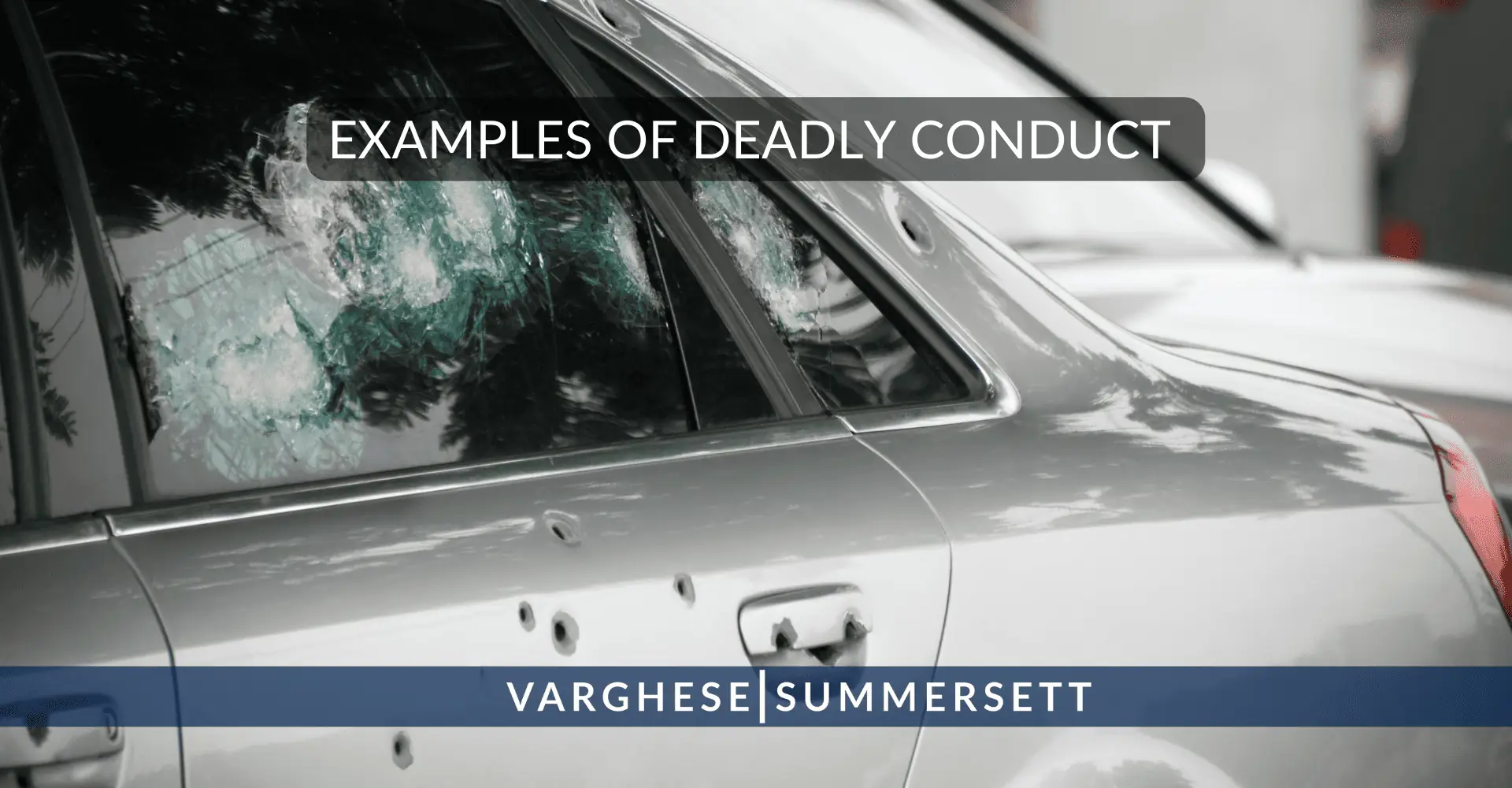Dallas Deadly Conduct Lawyer
It’s not uncommon to hear about people in Dallas being arrested for deadly conduct – but what does that mean? In most cases in Texas, a deadly conduct charge stems from the reckless use of a firearm, such as brandishing a gun at someone, or firing a gun in the air, in someone’s direction, or at a car, home, building.
However, deadly conduct does not always involve a firearm. It can also include engaging in some other form of reckless conduct that causes someone to fear for their life.
If you or a loved one has been accused of deadly conduct in Dallas or the surrounding area, it’s imperative to contact an experienced Dallas deadly conduct lawyer who has successfully defended these types of cases. A conviction can jeopardize your freedom and future, so don’t take chances regarding your criminal defense.
In this article, an experienced Dallas deadly conduct lawyer at Varghese Summersett explains deadly conduct, the punishment, possible defenses, and the importance of retaining a highly skilled criminal defense lawyer if you’ve been accused of this offense.
Texas Deadly Conduct Law – Texas Penal Code Section 22.05
Deadly Conduct is defined in Section 22.05 of the Texas Penal Code and outlines two ways to commit this offense. A person commits this offense if he or she:
a) recklessly engages in conduct that places another in imminent danger of serious bodily injury.
b) knowingly discharges a firearm in the direction of
- one or more individuals; or
- a habitation, building, or vehicle and is reckless as to whether the habitation, building, or vehicle is occupied
** Recklessness and danger are presumed if the actor knowingly pointed a firearm at or in the direction of another whether or not the actor believed the fiream to be loaded.
Serious Bodily Injury and Recklessness
There are two key terms in this statute that warrants further explanation: Serious bodily injury and Recklessness.
A serious bodily injury is one that creates a substantial risk of death or causes death, serious permanent disfigurement, or protracted loss or impairment of the function of any bodily member or organ.
Recklessness refers to the act of consciously disregarding a substantial and unjustifiable risk that a certain outcome will occur. This risk must be of such a nature and degree that its disregard constitutes a gross deviation from the standard or care that an ordinary person would exercise under all the circumstances.
The legal system is not easy for laypeople to understand. If you are facing this charge, a Dallas deadly conduct lawyer at Varghese Summersett can explain the elements of the offense and how it applies to your case in detail.

Examples of Deadly Conduct
As mentioned, deadly conduct is a fairly common charge in North Texas. While the details can vary, some possible examples of deadly conduct include:
- Firing a gun into the air on New Year’s Eve;
- Discharging a gun inside a bar during a fight;
- Drunkenly shooting a gun outside of a home in a neighborhood;
- Brandishing an gun at someone;
- Shooting up a person’s vehicle or residence;
- Flashing a gun at another driver during a road rage incident;
- Pointing a taser at someone to intimidate them;
Again, the details of each case can vary, so it’s important to call an experienced Dallas deadly conduct lawyer if you have been charged with this offense.
Punishment for Deadly Conduct in Dallas
If an individual is convicted of deadly conduct, they face possible jail time, a fine, and other collateral consequences. The punishment depends on how the offense was committed and can be either a misdemeanor or a felony.
Misdemeanor Deadly Conduct: A defendant faces a Class A misdemeanor, punishable by up to one year in jail and a $4,000 fine, if he or she recklessly engages in conduct that places another in imminent danger of serious bodily injury. An example of misdemeanor deadly conduct would be bradishing a gun at someone.
Felony Deadly Conduct: A defendant faces a third-degree felony, punishable by 2 to 10 years in prison and a maximum $10,00 fine, if he or she discharges a firearm in the direction of another individual or habitation, building, or vehicle. An example of felony deadly conduct would be firing a gun in a public.
In addition to jail time and fine, people convicted of deadly conduct also face collateral consequences, including trouble finding employment, housing or educational opportunities. That’s why it is so important to retain an experienced Dallas deadly conduct lawyer who will fight to avoid a conviction and keep your record clean.
At Varghese Summersett, we understand the stakes in these cases. Our experienced criminal defense attorneys have successfully represented clients facing all types of deadly conduct charges throughout Dallas and surrounding areas.
Defenses to Deadly Conduct in Texas
Defending a deadly conduct charge often involves challenging the prosecution’s evidence of recklessness, contesting the severity of the alleged risk or harm, or arguing for self-defense or defense of others.
The most common defense to deadly conduct involves:
- challenging the prosecution’s evidence;
- challenging the prosecution’s contention that the defendant acted recklessly;
- contesting that the defendant placed another in imminent danger of serious bodily injury;
- contesting the severity of the alleged risk or harm;
- arguing that the defendant acted in self-defense or defense of others;
- showing that the alleged victim consented to the alleged conduct.
These are just some possible defenses that can be raised. An experienced Dallas deadly conduct lawyer will thoroughly investigate the facts and circumstances to determine the best course of action and defense strategy.
Speak to a Dallas Deadly Conduct Lawyer Today
At Varghese Summersett, we understand the gravity of a deadly conduct charge and its potential consequences. Our experienced criminal defense attorneys have successfully represented clients facing conduct charges throughout Dallas and surrounding areas.
Our firm is dedicated to providing vigorous and personalized defense strategies for each client. We meticulously review all aspects of the case and fight for the best possible outcome at every step.
If you have been charged with deadly conduct in Dallas, don’t wait—contact our office today to discuss your case with a skilled Dallas deadly conduct lawyer. Call 214-903-4000 for a free consultation today.

FAQs About Deadly Conduct in Dallas
What qualifies as deadly conduct in Texas?
Deadly conduct in Texas involves recklessly engaging in conduct that places another in imminent danger of serious bodily injury or knowingly discharges a firearm towards a person, home, building, or vehicle.
In Texas, does deadly conduct only involve a firearm?
No, deadly conduct in Texas does not only involve a firearm. While firearm-related behavior can certainly lead to a deadly conduct charge, it is not the only type of conduct that this law covers. Any act that recklessly puts someone else at substantial risk of serious bodily injury, whether it involves a firearm or not, could potentially be charged as deadly conduct under Texas law.
Can you be charged with deadly conduct even if no one was injured?
Yes, it’s the act of creating a risk of serious bodily injury that qualifies as deadly conduct, not the actual infliction of injury.
Is there a difference in punishment if a firearm is discharged in deadly conduct?
Yes, if a firearm is discharged in the act, deadly conduct is charged as a third-degree felony, with stiffer penalties than the Class A misdemeanor charge.
What is the statute of limitations for deadly conduct?
The statute of limitations for deadly conduct in Texas depends on the degree of the offense. For a Class A misdemeanor, the limitation period is two years. For a third-degree felony, the limitation period is three years.
Is intent required for a charge of deadly conduct?
While specific intent to harm is not required, the individual must have acted recklessly or knowingly.
What are some defenses against a charge of deadly conduct?
Possible defenses include lack of intent or recklessness, insufficient risk, self-defense, or defense of others.
What if the person I allegedly endangered consented to my conduct?
Consent might provide a defense, but this is very fact-specific and depends on the circumstances of the case.
How can a lawyer help in a deadly conduct case?
A lawyer can review your case thoroughly, challenge the prosecution’s evidence, and present robust defenses. They will fight to protect your rights and achieve the best possible outcome. Call 214-903-4000 today for a free consulation with a Dallas deadly conduct lawyer at Varghese Summersett.





